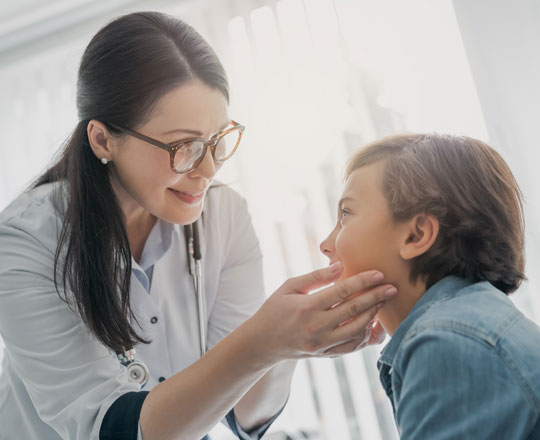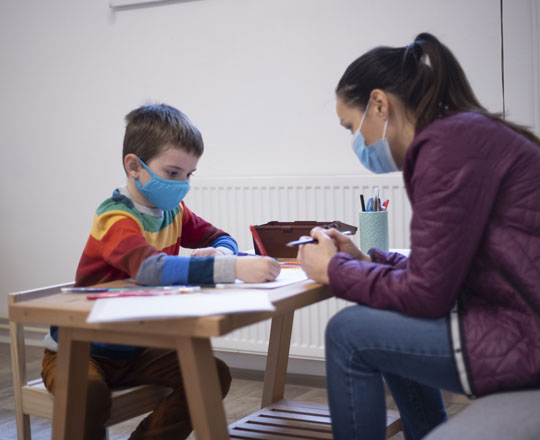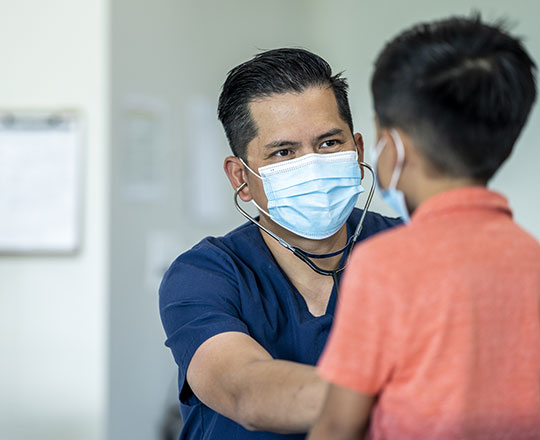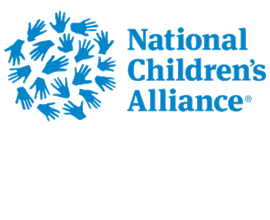
St. Luke’s CARES (Children at Risk Evaluation Services) is dedicated to the belief that every child deserves to be safe, heard, and supported. When concerns for abuse or neglect arise, it is vital that children get the opportunity to talk about what may have happened to them and receive appropriate interventions, such as medical evaluation and treatment, counseling, and other community support services. Most children never report their abuse. Those who keep it a secret or who “tell” and are not believed, are at far greater risk than the general population for psychological, emotional, social, and physical problems, often lasting into adulthood.
Our staff is comprised of specially trained professionals, offering services in a child-centered, developmentally appropriate manner.
St. Luke's CARES serves children and families from throughout southern and central Idaho, eastern Oregon, and northern Nevada. Every year, more than 1,700 children are evaluated for alleged abuse at CARES clinics, which provide services in Boise in the Ada County Victim Services Center, at St. Luke's in Twin Falls, and at the Nampa Family Justice Center in Nampa.
Referrals to St. Luke's CARES
Children are primarily referred to CARES by Child Protective Services (CPS), law enforcement agencies, and the court. Healthcare providers may refer to CARES after consulting with CARES medical staff. Referrals cannot be taken directly from parents, counselors, attorneys, or others. Such concerns will be directed to CPS or law enforcement agencies.
Contact Us
- Boise: 417 S. 6th Street; phone (208) 577-4460; fax (208) 577-4469
- Twin Falls: 2550 Addison Ave. E., Suite G; phone (208) 814-7750; fax: (208) 814-7759
Our Services
-

Medical and Forensic Evaluation
Our specially trained team provides caring and comprehensive medical and forensic evaluation of a child’s injuries, thus minimizing the need for repeated exams and interviews.
-

Resources and Referrals
We offer referrals to counselors and other community resources. Financial assistance for counseling may be available and staff will assist with the application for crime victim's compensation assistance.
-

Abuse Prevention and Advocacy
We offer lectures and training for professionals and the public on child abuse and neglect issues.
What to Expect at a CARES Appointment
-

Arrival and Registration
All adults will be asked to show photo identification. Alleged offenders are not allowed onsite at any time.
For registration, bring the child's insurance information and social security number. Upon registration, we will explain the appointment process. -

Child Interview
Our interviewer will meet with your child one-on-one, in a developmentally appropriate manner, in a neutral setting, allowing the child to share their experiences.
Interviews will be recorded. -

Medical Evaluation
With you and your child’s permission, our medical provider will perform an evaluation to ensure the child's health and safety, reassure the child that their body is okay, and diagnose and treat any medical conditions related to the abuse.
A medical social worker or provider may also speak with the child about their emotional well-being. -

Caregiver Assessment
Caregivers will meet with a medical social worker and medical provider to share family information, the child’s medical history, ask questions, and discuss concerns.
They may also meet with law enforcement and/or Health and Welfare staff.
Accreditation by the National Children's Alliance
The Force Behind Children's Advocacy Centers
CARES is an accredited member of the National Children's Alliance.
National Children’s Alliance (NCA) is a professional membership organization on a mission to make one big difference, one child at a time.
Frequently Asked Questions
Click each question below for its answer:
We ask families to plan on two hours for a CARES appointment. The actual time depends on the child, and the circumstances of the appointment.
The child and their designated caregiver(s). To provide the best care to the child and caregiver needs, additional friends or family attending appointments should be limited. If you must bring another child, it is recommended to bring someone able to assist with that child’s supervision while at CARES.
The interview is for medical purposes and is considered legal evidence, therefore caregivers will not be able to watch the interview.
A copy of the CARES evaluation record is provided only to referring agents as a part of the ongoing investigation. Any questions relating to an open investigation should be directed to the assigned law enforcement officer, victim witness coordinator, or Health and Welfare caseworker.
If new disclosures or additional information occurs after the CARES appointment, please contact the assigned law enforcement officer, victim witness coordinator, or Health and Welfare caseworker.
Questions and concerns often arise after a CARES appointment. You can call our office MondayFriday, 8 a.m.-4:30 p.m., to speak to a CARES staff member about your child’s appointment. Please call CARES Boise at (208) 577-4460 or CARES Twin Falls at (208) 814-7750.
Families meeting with a CARES medical social worker will be provided with support information and resources. Based on identified needs during appointment, additional referrals and advocacy may be provided by the CARES team after the CARES appointment for long-term support and intervention.
Reassure your child that you believe him or her. Give your child your permission to talk to the people at CARES. Do not ask further questions but listen and acknowledge if there are things your child wants to talk about. A good night’s sleep prior to the appointment is very helpful, and it is important for your child to be fed a meal before coming to CARES. Please ensure your child has taken any of their routinely prescribed medications.
Do You Need Assistance?
-
Reporting Child Abuse
-
As an adult in the state of Idaho, you are a mandated reporter for any suspected child abuse, neglect, or abandonment. Remember, you do not need proof, only concern.
To report suspected abuse, neglect, or abandonment when a child is not in immediate danger, please follow both steps below:
- Call your local law enforcement:
- Ada County Dispatch: (208) 377-6790
- Canyon County Dispatch: (208) 454-7531
- For information on law enforcement in other counties, please call 211 (Idaho CareLine).
- Call local Child Protection Services:
- Treasure Valley: (208) 334-5437 (KIDS)
- Statewide: (855) 552-5437 (KIDS)
- You can be connected to either of these numbers by simply dialing 211.
If a child is suspected to be in immediate danger, please call 911.
If YOU are being abused or neglected, call 911.
- Call your local law enforcement:
-
-
Are You Experiencing Thoughts of Suicide or Harm?
-
If you're experiencing thoughts of suicide, harm to yourself or others, or know someone that is, call or text the Idaho Suicide Prevention Hotline at 988. It's a confidential line, staffed 24/7, to provide crisis intervention, emotional support, problem-solving, and referrals to local resources for persons at risk for suicide and those concerned about them.
You can also be connected by dialing 211 and selecting option 2.
If you or someone you love is in immediate danger, call 911 or access the nearest emergency department.
-
Additional Child Abuse Resources
-
Idaho Resources
-
National Resources


